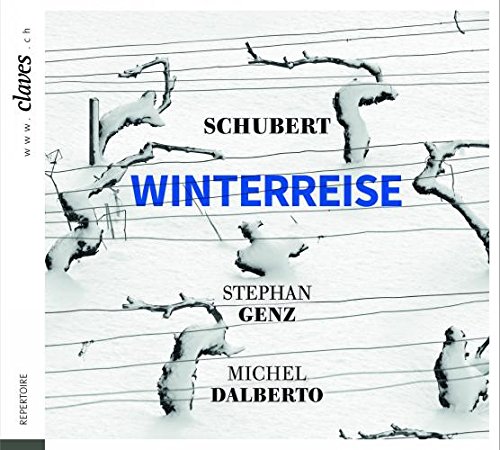SCHUBERT Winterreise
View record and artist detailsRecord and Artist Details
Composer or Director: Franz Schubert
Genre:
Vocal
Label: Claves
Magazine Review Date: 01/2016
Media Format: CD or Download
Media Runtime: 67
Mastering:
DDD
Catalogue Number: 50 1606

Tracks:
| Composition | Artist Credit |
|---|---|
| Winterreise |
Franz Schubert, Composer
Franz Schubert, Composer Michel Dalberto, Piano Stephan Genz, Baritone |
Author: Richard Wigmore
Even amid the wanderer’s encroaching exhaustion, the sense of forward motion is never lost. Phrasing, as ever, in long lines, Genz and Dalberto remind you that No 10, ‘Rast’, is marked mässig (ie moderato), and evoke a weary trudge rather than stasis. ‘Die Krähe’ rivals Peter Schreier, with Schiff (Decca), as the swiftest on disc, and distils a palpable sense of panic. Some may feel Genz underplays the impassioned cry of ‘Wein auf meiner Hoffnung Grab’ (‘Weep on the grave of my hopes’) in ‘Letzte Hoffnung’, sung strictly in tempo. But like the brusque, even resentful, address to the sleeping villagers in ‘Im Dorfe’ and the unflinching onward trudge of ‘Der Wegweiser’ (shades here of the Andante of the Great C major Symphony), this is of a piece with the whole performance.
In ‘Das Wirtshaus’ Genz embodies a physical and spiritual weariness without histrionics. He then hurls out manic defiance in ‘Mut’ , where Dalberto underlines the military march parody, before the two final songs. ‘Die Nebensonnen’ is ruefully resigned, yet heeding Schubert’s nicht zu langsam marking, while ‘Der Leiermann’, sung without nuance, exudes a spectral calm. Other versions of this fathomless cycle, including those mentined above, may be more immediately engulfing. But if you prefer a predominantly brisk interpretation that tends to stress stoicism and ironic bitterness over pathos and incipient derangement, you’ll find that Genz, in fine voice, and Dalberto give a profoundly thought-through performance. For me, at least, they pass the crucial test of making Schubert’s fathomless cycle a cathartic experience.
Explore the world’s largest classical music catalogue on Apple Music Classical.
Included with an Apple Music subscription. Download now.

Gramophone Digital Club
- Digital Edition
- Digital Archive
- Reviews Database
- Events & Offers
From £9.20 / month
Subscribe
Gramophone Club
- Print Edition
- Digital Edition
- Digital Archive
- Reviews Database
- Events & Offers
From £11.45 / month
Subscribe
If you are a library, university or other organisation that would be interested in an institutional subscription to Gramophone please click here for further information.






